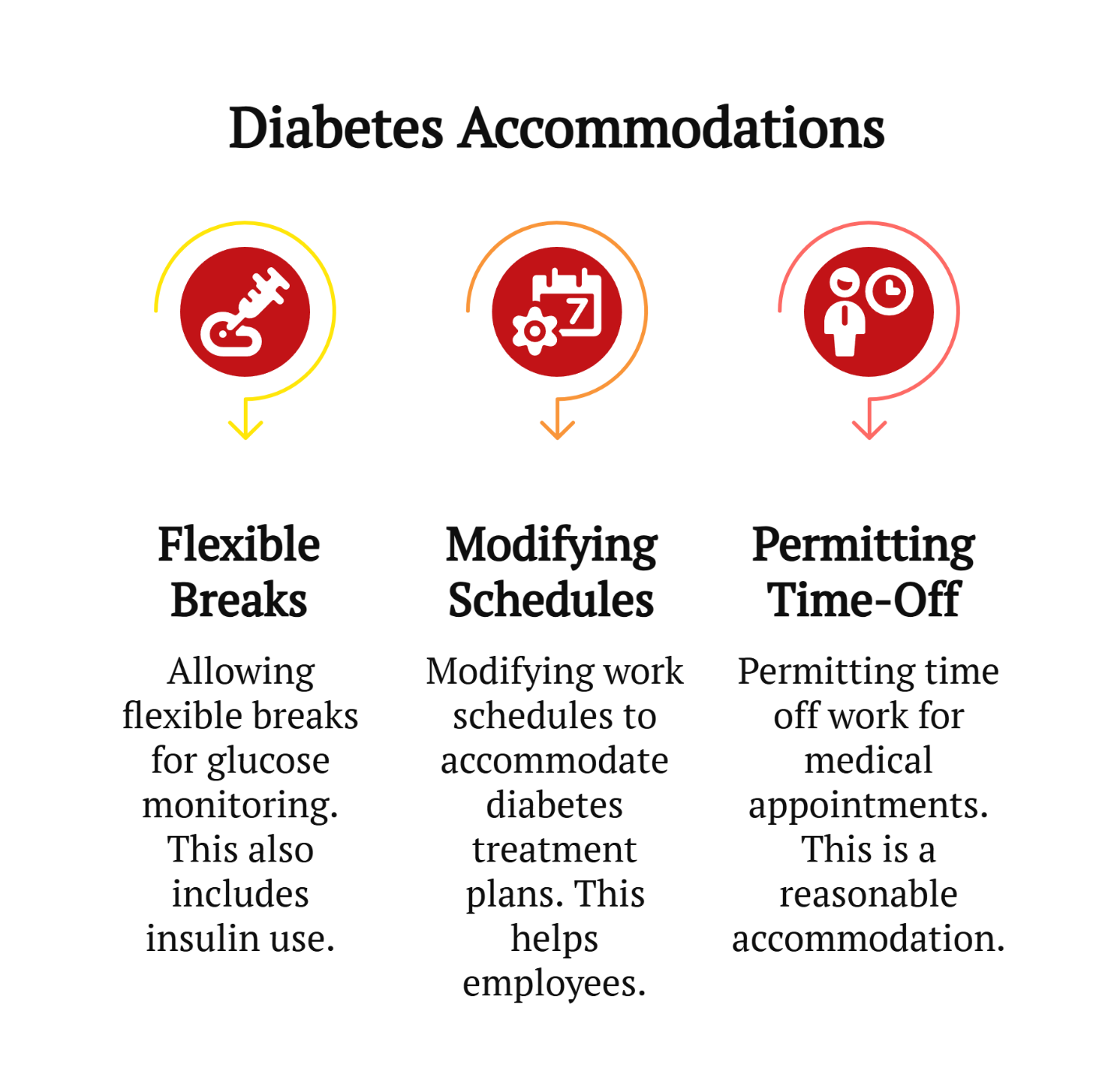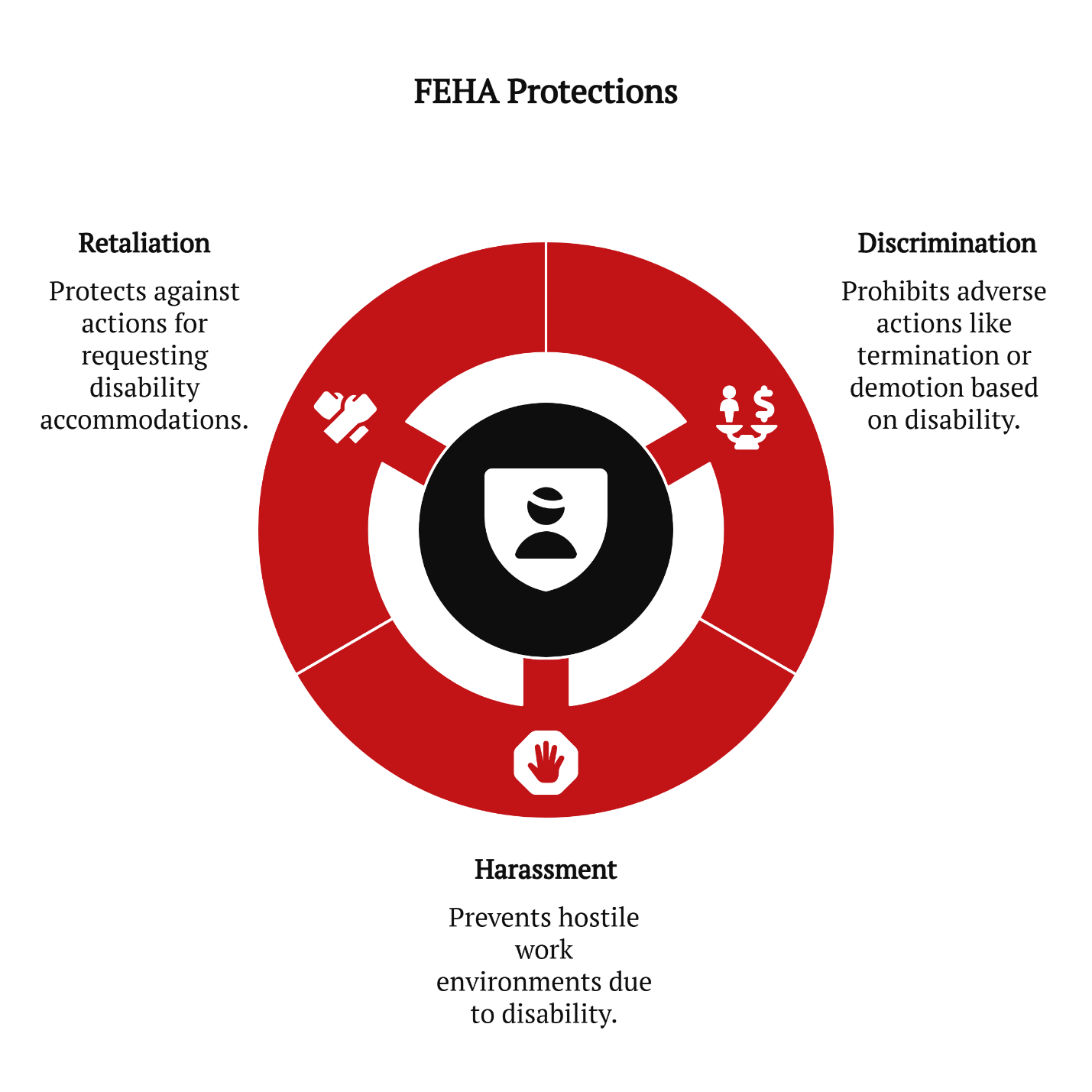📌 Key Takeaways
Diabetes May Qualify as a Protected Disability Under California Law:
Under California’s Fair Employment and Housing Act (FEHA), diabetes—whether Type 1 or Type 2—can be considered a disability if it substantially limits major life activities such as eating or self-care, even when controlled by medication.
Employers Must Engage in an Interactive Process for Accommodations:
FEHA requires employers with five or more employees to participate in a good faith, interactive dialogue when an employee with a qualifying disability requests workplace adjustments, such as breaks for glucose checks or schedule modifications.
Accommodations Must Be Reasonable, Not Exact:
Employers are not obligated to grant every specific accommodation requested but must consider effective alternatives that allow the employee to perform essential job duties without undue hardship.
Discrimination and Retaliation Are Prohibited:
FEHA bars adverse actions like termination or demotion based on disability status or accommodation requests. It also prohibits retaliation against employees who assert their legal rights, regardless of whether the accommodation is ultimately granted.
Legal Protections Rely on Individual Circumstances:
Determining whether a legal violation has occurred involves a detailed, fact-based analysis. Employees facing potential discrimination, denial of accommodations, or retaliation are strongly encouraged to seek professional legal advice.
Understanding how FEHA applies to diabetes-related workplace issues can help employees recognize when legal rights may be implicated—and when it’s time to consult an employment law attorney.
Managing diabetes in the workplace involves more than personal health—it may involve legal protections under California law. Employees who have experienced adverse treatment after disclosing their condition or requesting a workplace adjustment may wonder whether such treatment is permissible. While there is no substitute for actual individualized legal consultation, understanding general legal protections may help individuals identify when workplace situations could potentially intersect with California’s anti-discrimination statutes.
This article outlines how the Fair Employment and Housing Act (FEHA), California’s primary anti-discrimination statute, may provide protections for employees managing diabetes.
Diabetes as a Potentially Protected Disability
California law generally defines physical disability as a physiological disease, disorder, condition, cosmetic disfigurement, or anatomical loss that affect one or more body system, and limits major life activities. Diabetes may fall within this definition because it impacts the endocrine system and can substantially limit functions such as eating, digestive regulation, or self-care. Both Type 1 and Type 2 diabetes may be considered disabilities under FEHA, depending on how the condition affects day-to-day functioning.
FEHA does not require that a condition be completely disabling to be recognized as a disability. The law is triggered by a condition which limits a major life activity. The statute also protects individuals whose conditions are controlled by medication but would otherwise limit major life activities if untreated.
Whether diabetes qualifies as a protected disability in a specific situation depends on a factual and legal evaluation of how the condition impacts the individual. This determination should be involve legal analysis by competent employment counsel.
Employer Responsibilities: Reasonable Accommodations

Employers covered by FEHA—generally those with five or more employees—are required to engage in a good faith interactive process with employees who request accommodations for a qualifying disability. A reasonable accommodation within the meaning of the statute is a modification that allows the employee to perform essential job functions.
In diabetes-related contexts, a reasonable accommodation may involve:
- Allowing flexible breaks for glucose monitoring or insulin use
- Modifying work schedules to accommodate treatment plans
- Permitting time off work
Employers are not always required to provide every and any accommodation requested but must engage in a meaningful discussion to explore effective options. If an employer refuses to engage in this process or denies accommodation without appropriate justification, such conduct may violate the FEHA.
Evaluating whether a specific denial of an accommodation request violates the law involves various legal considerations. Employees who experience such situations are strongly encouraged to consult a qualified employment law attorney to assess whether the employer’s conduct violates the law.
Discrimination, Harassment, and Retaliation Protections

FEHA prohibits discrimination based on a disability. This includes adverse employment actions such as termination of employment, or a demotion. Additionally, the law prohibits harassment based on a disability, including hostile work environment harassment.
California law also prohibits unlawful retaliation against certain protected activities, like for example requesting an accommodation for a disability.
Whether a particular employment action constitutes discrimination or retaliation is a fact-intensive inquiry. Legal standards under FEHA require a nuanced review of workplace conduct and underlying motivations. Affected individuals are advised to seek legal consultation to explore whether the statute applies to their specific circumstances.
Conclusion
California’s FEHA establishes a broad statutory framework that may protect employees with diabetes in situations involving discrimination, failure to accommodate, or retaliation. The law’s protections are rooted in how a condition affects major life activities, the employer’s obligations to reasonably accommodate, and whether adverse treatment follows disability disclosure or accommodation requests.
Consultation with a qualified employment attorney is strongly recommended for anyone seeking to understand their rights or options under the law and whether they apply to a particular situation requires case-specific legal evaluation.
Frequently Asked Questions
What type of workplace behavior could potentially violate the rights of an employee with diabetes?
Conduct such as denying reasonable accommodations, issuing discipline after disclosure of a diabetes diagnosis, or creating a hostile work environment may raise concerns under FEHA. Determining whether such conduct constitutes unlawful discrimination or retaliation depends on multiple legal factors and should be reviewed by a qualified attorney.
Frequently Unasked Question
How might workplace technology policies affect an employee’s diabetes management rights?
Policies that prohibit or restrict the use of personal medical devices during work hours may conflict with an employee’s need to manage diabetes. In some situations, such restrictions may implicate reasonable accommodation obligations under FEHA. Whether a specific policy creates a legal issue depends on individual circumstances, which must be evaluated through legal consultation.
Disclaimer:
This content is for informational purposes only. This content is not legal advice. No attorney-client relationship is formed through this content. Please consult a qualified attorney in your jurisdiction for legal advice specific to your situation.
Protect Your Rights | The Akopyan Law Firm, A.P.C. | Top Gun Employment Lawyers
Have you been wrongfully terminated from your job? Have you suffered discrimination, harassment, or retaliation in the workplace? Has your employer violated wage and hour laws? If so, we can help. The Akopyan Law Firm, A.P.C. is dedicated to protecting and enforcing employees’ rights throughout Southern California. With a 97% success rate and millions recovered for our clients, our team of experienced and talented employment lawyers can fight to secure the justice you deserve.
Take the First Step Towards Securing Justice: Call us today to speak with one of our experienced employment lawyers. The firm offers case evaluations free of charge.
Contact Us Today:
- Phone: (818) 509-9975
- Office Locations: Los Angeles, Bakersfield, Costa Mesa, Temecula, Rancho Cucamonga, Oxnard, Culver City, and San Diego in California.
Important: Contacting the Akopyan Law Firm, A.P.C. does not create an attorney-client relationship, but all communications will remain private and confidential. Each case is unique. The Akopyan Law Firm, A.P.C., does not guarantee any outcome.

